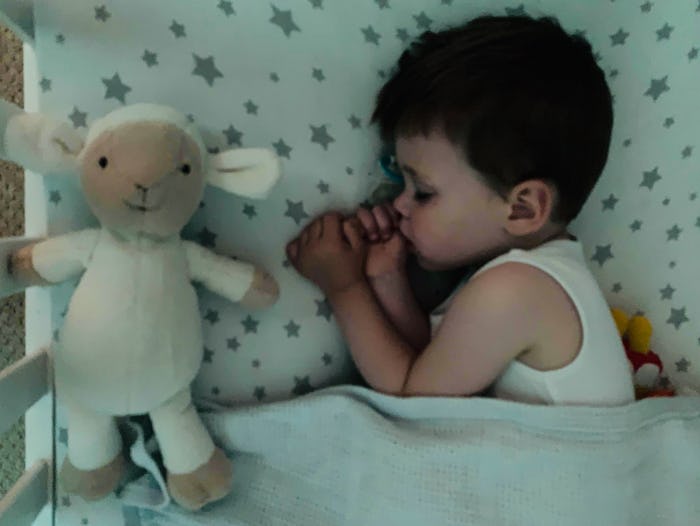Toddler

Honestly, Your Toddler Probably Sleeps Better In The Dark
But to night-light or not to night-light is the real question.
It's such a feeling of accomplishment for new parents when their baby finally sleeps through the night. So exciting, in fact, that they may even believe the hardest part of their child's sleep journey is over. I'm sorry to be the bearer of unfortunate news, but the toddler years can present their own set of sleep challenges. One such debate among parents involves the use of a night-light, whether or not toddlers should sleep in the dark, and how each lighting scenario can affect their child's sleep. Regardless of where you fall in this conversation, one thing is for certain: getting a good night's rest is super important for your child — and you, too. So I spoke with an expert to find out more about the pros and cons of the Great Light Debate. (To crack a closet door or not, that is the question here.)
Dr. Harvey Karp, renowned pediatrician, inventor, and author of the best-selling parent guide, Happiest Toddler on the Block (among others), is generally a fan of lights out at nighttime. In an interview with Romper, he writes, "Reducing lights — like the glow from a TV, outside streetlights, or hallways — is generally a bright idea. Light actually goes right through closed eyelids, telling the nervous system to shut off your melatonin, which is the the brain’s natural sleep hormone. That’s why light — especially white and blue light — make it hard for tots to nod off." (By the way, I had no idea that light can get through a closed eyelid.)
But (and isn't there always a but?), Karp believes there is one big exception. "A very dim, warm yellow night-light helps some kids sleep better. As we all know, the dark can make a child's imagination run wild. Many feel safer if they can see the outline of familiar surroundings when they awaken at 3 a.m. and aren’t greeted with a gulf of darkness. Plus, a night-light can assist parents making a quick assessment of their child’s wellbeing without turning on the room light or beaming a bright flashlight into the room. A dim light also makes it easier to navigate a toddler’s toy-strewn floor — making it less likely that you’ll experience the exquisite pain that comes from stepping on a LEGO." Having done that myself a time or two, I fully endorse this reasoning.
If you decide to buy a night-light for your child's room, Karp suggests using a night-light bulb that’s about four watts to illuminate the room without disturbing your toddler, as well as not putting it directly in your child’s line of vision. And while there's an old theory floating around that using a night-light can make your toddler more nearsighted, have no fear. Karp writes, "Don't believe it. Researchers have found zero association between night-lights and vision problems." Well, in the grand scheme of parenting questions and concerns, having one less thing to worry about seems like a win, no?
While the Great Light Debate may just come down to your child's own sleep preferences, it's good to know there's certainly nothing wrong with your toddler sleeping in the dark if that's what they prefer. And a dim night-light certainly seems to have its advantages, especially if your child is afraid of a monster in their closet or is prone to leaving the LEGOs out (you know who you are, kid). I think the key factors here are making sure the night-light is dim, and at first, checking in on your child during the night to see how they are adjusting to the night-light situation. Here's to sweet dreams and a good night's sleep for everyone.
Expert:
Dr. Harvey Karp, renowned pediatrician, inventor, and author of the best-selling parent guide, Happiest Toddler on the Block